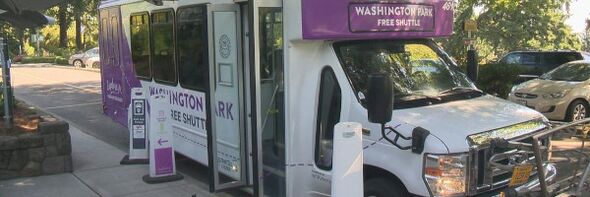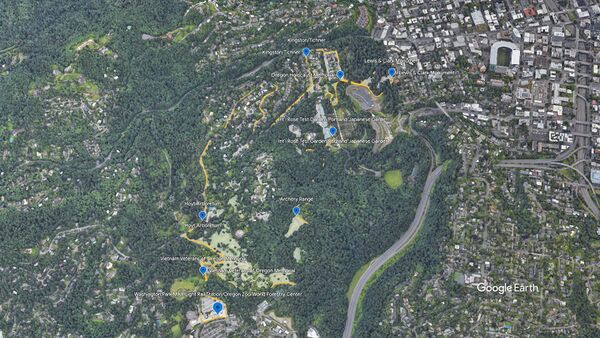EcoMotion: Electrifying Washington Park's Circulator for a Greener Future: Difference between revisions
No edit summary |
No edit summary |
||
| Line 98: | Line 98: | ||
participants to gain valuable knowledge that will help reduce the cost of future | participants to gain valuable knowledge that will help reduce the cost of future | ||
deployments and support business growth. | deployments and support business growth. | ||
{{#ev:youtube|HJRegTKtZj4}} | |||
Latest revision as of 05:36, April 19, 2024
| EcoMotion: Electrifying Washington Park's Circulator for a Greener Future | |
|---|---|
 Washington Park Free Shuttle | |
| Team Organizations | Elywhere Urban.Systems Explore Washington Park Pangea EV MTR Western |
| Team Leaders | Wilfred Pinfold |
| Participating Municipalities | Portland OR |
| Sectors | Transportation |
| Status | In Deliberations |
| Last Updated | May 2, 2024 |
Summary
This project converts five existing Ford transit buses to electric power. This conversion not only reduces cost over buying new it ensures the gasoline engine is removed from the road and recycled instead of being sold for another use. It also retains the chassis and other equipment saving emissions over a new purchase. Washington Park is the crown jewel of Portland. This 410-acre park is home to the Oregon Zoo, the World Forestry Center, the Hoyt Arboretum, the Rose Garden, and the Japanese Garden. Washington Park brings in 3.5 million visitors annually. Close to the heart of Portland, this park is a vital resource connected to communities across the area by TriMet’s electric light rail service. Once in the park there is a free shuttle that connects to these key attractions.
Beyond its role as a convenient shuttle, this bus represents an opportunity for transformative change rooted in social justice, economic empowerment, and environmental sustainability. Our project aims to spearhead transportation decarbonization efforts by electrifying the shuttle that connects to the Park’s key attractions. This initiative aligns with broader objectives of energy efficiency, renewable energy integration within the transportation sector. By transitioning to electric buses powered by renewable energy sources, we not only mitigate greenhouse gas emissions but also advance equitable access to sustainable transportation.
Renewable Energy and Transportation Decarbonization
The Circulator Bus currently runs every 15 minutes, 9 hours per day in the summer and 6 hours per day in the winter. The route serves 9 stops and is 4.4 miles in length. Last year the bus fleet operated for a total of 5653 bus hours across a fleet of five buses. We estimate that the bus electrification project will reduce the current carbon footprint by 113 Tons of CO2 per year, while also affecting other positive socio-economic and climate resilience outcomes.This represents a significant step towards reducing carbon emissions within Washington Park and the broader Portland metropolitan area. Furthermore, integrating renewable energy sources ensures that bus operation remains carbon-neutral. Our plan converts five existing Ford transit buses to electric power. This conversion not only reduces cost over buying new it ensures the gasoline engine is removed from the road and recycled instead of being sold for another use. It also retains the chassis and other equipment saving emissions over a new purchase. By taking five gasoline engines off the road and replacing them with electric counterparts powered by sustainably generated electricity we expect to reduce emissions by more that 113 tons of CO2 every year. For the charging infrastructure we have chosen an integrated storage and charging unit made by Elywhere North America based in Portland. Unlike traditional charging stations this unit offers a solution that installs in a matter of hours compared to other stations where the process can take up to 18 months. In addition this unit is cost effective requiring no electrical upgrade, no digging and no extra sight work. The station is configurable and movable so we can customize it for Washington Park’s needs. By using storage in our solution we can capitalize on overnight charging and deliver DC fast charging to the buses during the day. There is already some solar capacity in the park but this is dedicated to the Zoo. We intend to provide sufficient solar capacity to ensure the buses run mostly on power generated in the park. Our plan is to place these solar panels over the charging station in order to provide a covered bus boarding area close to the light rail stop.
Advancing Racial and Social Justice
Our proposal seeks to electrify this circulator bus, not just as a means of modernizing transportation, but as a catalyst for equity and progress in one of Portland's most disadvantaged communities. The buses used for the shuttle are operated and maintained by MTR Western located in the Multnomah County Drainage District (MCDD). The MCDD is home to the Amazon, Fedex, DHL and UPS logistics hubs, Jubitz truck stop, and Portland International Airport to mention just a few. MTR Western’s facilities are already in this area and we plan to build and maintain the buses here too. By investing in infrastructure and workforce development here, we're not just upgrading buses; we're investing in the future of the neighborhood. We're equipping businesses with the skills and opportunities needed to thrive in the rapidly growing market of electric vehicle technology.There is a growing community of electric vehicle companies in and around the Multnomah County Drainage District. We plan to use local companies for parts, systems and labor. By doing this we're not just reducing emissions; we're paving the way for a greener, healthier city for generations to come.
Project beneficiaries
Our project is designed to benefit multiple stakeholders, including the 3.5 million visitors to Washington Park, project employees, and residents and businesses in the Multnomah County Drainage District. Park Visitors: By transitioning from gasoline-powered vehicles to electric buses, the park will experience a reduction in greenhouse gas emissions and air toxics. This will result in cleaner air, contributing to improved public health outcomes for park visitors. Additionally, the shift to electric transportation aligns with the park's commitment to sustainability and environmental stewardship, enhancing the overall visitor experience. Project Employees: The project will create employment opportunities and provide training in electric vehicle conversion and maintenance. By equipping workers with these skills, they will be prepared to meet the growing demand for electric vehicle technology over the next 20 years. Multnomah County Drainage District Residents and Businesses: By choosing the Multnomah County Drainage District as the site for the conversion and maintenance of the buses, we are seeding a potential center for transportation electrification in the community. This has the potential to bring much-needed jobs and economic prosperity to a historically underserved area. The establishment of a hub for electric vehicle conversion and maintenance could attract investment, foster innovation, and catalyze economic development, benefiting residents and businesses within the district. Project Partners: There are a number of uncertainties in how the charging station, storage and buses are configured. By supporting this project PCEF will enable the participants to gain valuable knowledge that will help reduce the cost of future deployments and support business growth.
